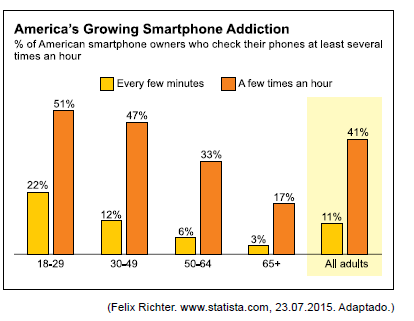Questões de Vestibular de Inglês - Interpretação de texto | Reading comprehension
Foram encontradas 4.863 questões
One of the negative effects of industrialization on human activity and the environment is the production of excessive light. Most people do not consider the surplus of artificial light as a form of pollution because it is not permanent; all we must do is collectively turn out our lights to make it disappear. In reality, however, such a solution is unrealistic because our society needs artificial light to function. Light pollution is mainly caused by lighting systems that are misdirected, excessive, inefficient or unnecessary. The negative effects of light pollution on human activity are numerous. From an economic point of view, for example, the use of excessive lighting or unnecessary lighting constitutes a waste of energy that is costly to both the individual and to industries. On a larger scale, excessive lighting can have an impact on global climate change if the required electricity was generated by burning fossil fuels. Wildlife and plants are also affected. For example, nighttime lighting can confuse animals that migrate (like migratory birds), can modify predator-prey relationships, and can even alter competitiveness within the same species.

Disponível em:<http://culturaesquizofrenica.blogspot.com/2012/02/historias-cruzadas-help.html>. Acesso em: 17 out. 2018.
The four women shown in the picture (Text 3) are in different positions: two standing and two sitting. These positions may be related to

According to the chart,
An increasing body of evidence suggests that the time we spend on our smartphones is interfering with our sleep, self-esteem, relationships, memory, attention spans, creativity, productivity and problem-solving and decision-making skills. But there is another reason for us to rethink our relationships with our devices. By chronically raising levels of cortisol, the body’s main stress hormone, our phones may be threatening our health and shortening our lives.
If they happened only occasionally, phone-induced cortisol spikes might not matter. But the average American spends four hours a day staring at their smartphone and keeps it within arm’s reach nearly all the time, according to a tracking app called Moment.
“Your cortisol levels are elevated when your phone is in sight or nearby, or when you hear it or even think you hear it,” says David Greenfield, professor of clinical psychiatry at the University of Connecticut School of Medicine and founder of the Center for Internet and Technology Addiction. “It’s a stress response, and it feels unpleasant, and the body’s natural response is to want to check the phone to make the stress go away.”
But while doing so might soothe you for a second, it probably will make things worse in the long run. Any time you check your phone, you’re likely to find something else stressful waiting for you, leading to another spike in cortisol and another craving to check your phone to make your anxiety go away. This cycle, when continuously reinforced, leads to chronically elevated cortisol levels. And chronically elevated cortisol levels have been tied to an increased risk of serious health problems, including depression, obesity, metabolic syndrome, Type 2 diabetes, fertility issues, high blood pressure, heart attack, dementia and stroke.
(Catherine Price. www.nytimes.com, 24.04.2019. Adaptado.)
An increasing body of evidence suggests that the time we spend on our smartphones is interfering with our sleep, self-esteem, relationships, memory, attention spans, creativity, productivity and problem-solving and decision-making skills. But there is another reason for us to rethink our relationships with our devices. By chronically raising levels of cortisol, the body’s main stress hormone, our phones may be threatening our health and shortening our lives.
If they happened only occasionally, phone-induced cortisol spikes might not matter. But the average American spends four hours a day staring at their smartphone and keeps it within arm’s reach nearly all the time, according to a tracking app called Moment.
“Your cortisol levels are elevated when your phone is in sight or nearby, or when you hear it or even think you hear it,” says David Greenfield, professor of clinical psychiatry at the University of Connecticut School of Medicine and founder of the Center for Internet and Technology Addiction. “It’s a stress response, and it feels unpleasant, and the body’s natural response is to want to check the phone to make the stress go away.”
But while doing so might soothe you for a second, it probably will make things worse in the long run. Any time you check your phone, you’re likely to find something else stressful waiting for you, leading to another spike in cortisol and another craving to check your phone to make your anxiety go away. This cycle, when continuously reinforced, leads to chronically elevated cortisol levels. And chronically elevated cortisol levels have been tied to an increased risk of serious health problems, including depression, obesity, metabolic syndrome, Type 2 diabetes, fertility issues, high blood pressure, heart attack, dementia and stroke.
(Catherine Price. www.nytimes.com, 24.04.2019. Adaptado.)
No trecho do primeiro parágrafo “But there is another reason for us to rethink our relationships with our devices”, o termo sublinhado introduz uma
An increasing body of evidence suggests that the time we spend on our smartphones is interfering with our sleep, self-esteem, relationships, memory, attention spans, creativity, productivity and problem-solving and decision-making skills. But there is another reason for us to rethink our relationships with our devices. By chronically raising levels of cortisol, the body’s main stress hormone, our phones may be threatening our health and shortening our lives.
If they happened only occasionally, phone-induced cortisol spikes might not matter. But the average American spends four hours a day staring at their smartphone and keeps it within arm’s reach nearly all the time, according to a tracking app called Moment.
“Your cortisol levels are elevated when your phone is in sight or nearby, or when you hear it or even think you hear it,” says David Greenfield, professor of clinical psychiatry at the University of Connecticut School of Medicine and founder of the Center for Internet and Technology Addiction. “It’s a stress response, and it feels unpleasant, and the body’s natural response is to want to check the phone to make the stress go away.”
But while doing so might soothe you for a second, it probably will make things worse in the long run. Any time you check your phone, you’re likely to find something else stressful waiting for you, leading to another spike in cortisol and another craving to check your phone to make your anxiety go away. This cycle, when continuously reinforced, leads to chronically elevated cortisol levels. And chronically elevated cortisol levels have been tied to an increased risk of serious health problems, including depression, obesity, metabolic syndrome, Type 2 diabetes, fertility issues, high blood pressure, heart attack, dementia and stroke.
(Catherine Price. www.nytimes.com, 24.04.2019. Adaptado.)

A frase atribuída a Steve Jobs sugere que
The $900bn question: What is the Belt and Road initiative?
By Tom Phillips https://www.theguardian.com Acessado em 25/10/2017
It’s a confusing title but it could turn out to be the largest ever infrastructure project with close to a trillion dollars being invested across the globe
In concrete terms, the Belt and Road initiative is an immensely ambitious development campaign through which China wants to boost trade and stimulate economic growth across Asia and beyond. It hopes to do so by building massive amounts of infrastructure connecting it to countries around the globe. By some estimates, China plans to pump $150bn into such projects each year. In a report released at the start of this year, ratings agency Fitch said an extraordinary $900bn in projects were planned or underway.
The Belt and Road initiative has two main prongs: one is called the ‘Silk Road Economic Belt’ (the belt) and the other the ‘21st Century Maritime Silk Road’ (the road). Bewilderingly, the ‘road’ is not actually a road but rather a sea route linking China’s southern coast to east Africa and the Mediterranean. The ‘belt’ is a series of overland corridors connecting China with Europe, via Central Asia and the Middle East.
A iniciativa Belt and Road
What the World Needs Now
Lyrics by Hall David
What the world needs now is love,
sweet love It’s the only thing that there’s just too little of
What the world needs now is love,
sweet love, No not just for some but for everyone.
Lord, we don’t need another mountain,
There are mountains and hillsides enough to climb
There are oceans and rivers enough to cross,
Enough to last till the end of time.
Este trecho da letra da música sugere que
Utilize o infográfico para responder a questão.

Utilize o infográfico para responder a questão.

Read the ad.

This piece of advertisement is asking people to make a
difference by
Leia o texto para responder à questão.
W.H.O. calls ‘vaccine hesitancy’ an increasing concern globally
Rick Gladstone
August 18, 2015
The World Health Organization warned Tuesday of what it called the growing problem of “vaccine hesitancy,” when people delay or refuse vaccines for themselves or their children. In a statement on its website, the organization called the problem “a growing challenge for countries seeking to close the immunization gap.” Globally, the organization said, one in five children still do not receive routine lifesaving immunizations, and 1.5 million children die each year of diseases that could have been thwarted by vaccines.
(www.nytimes.com)
